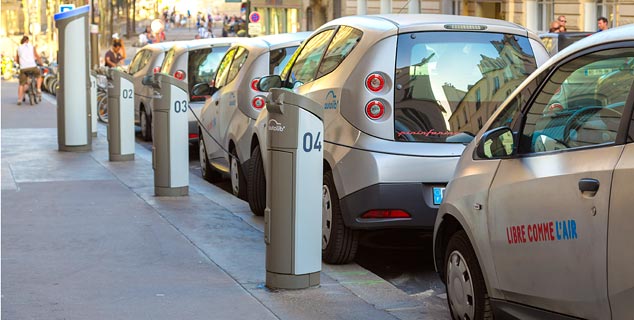
London is to get a new fleet of electric cars.
It’ll be a pay-as-you-go scheme, that works a bit like the ‘Boris bikes’ – you hop in at one charging point and drop it off at another.
There’s already a similar scheme in the French capital. A spokesman for Bollore, the company behind it, who will also run the London scheme, enthused: “Lots of people aged 18 to 25 are using the cars to go out for the evening… They might use them to go to a nightclub, dinner or the theatre. Some make love in the cars. They use them like a hotel. You can use them for anything.”
Frankly, he’s not selling it to me. That sort of malarkey might go down well in Paris, but I don’t want to have to carry a bottle of Domestos around with me any time I fancy nipping from point to point.
But it does show that electric cars are becoming ever more mainstream…
What people want from electric cars – convenience
Plans for London’s new electric car scheme comes as concerns about the city’s air quality are spiking.
Meanwhile, Zac Goldsmith, Tory aristo-environmentalist and London mayoral hopeful, is calling for all new cabs and delivery vans to be electric-powered.
We’re reaching a tipping point. But I don’t think it’s about anything as abstract as ‘the environment’. I think it has a lot more to do with the proliferation of smartphones and online interaction.
People increasingly want their physical lives to resemble their digital ones. Clean. Convenient. Nicely designed. User-friendly. Unencumbered.
Imagine a future where you don’t need to own and store a car. You walk out of your front door, you hail one on your phone, it arrives instantly and takes you where you want to go by the most direct route, avoiding roadworks. You get out and it drives away.
You don’t have to think about parking or designated drivers or MOTs or insurance or anything else. Who wouldn’t want that?
This is not science fiction. We’ve got electric cars. We’ve got driverless cars. There are legal, regulatory, social and logistical obstacles. But as far as the technology goes, this is do-able.
It’s just a matter of getting to a point where electric vehicles make more sense for mass consumers than petrol cars. And there’s one key piece of the puzzle that really needs to be filled in for that to happen.
The biggest thing holding back fully electric cars
The big thing holding back electric cars from mass adoption is battery power.
‘Range anxiety’ – the fear that you’re going to run out of juice before you get to your destination – doesn’t matter if you’re just scooting about your local city at low speeds in a jumped-up scooter.
But it’s a bigger deal if you’re hoping to make it from London to Glasgow, and you’re not sure of how many charging stations are on the way. And obviously, for countries with much bigger distances to cover, such as the US or Australia, it’s a much bigger problem.
One answer is to have more charging stations. But really, what’s needed is a better battery.
As news website Quartz points out, Tesla, the main player in electric cars, uses “high volumes of current-generation lithium-ion batteries”. In other words, the cars are powered by the same thing that runs your laptop.
“But that’s expensive, accounting for what some estimate to represent $20,000-$40,000 of the cost of manufacturing each of Tesla’s high-end Model S sedans.”
In short, batteries need to be smaller, cheaper and more powerful. That’ll bring down the price of electric cars, and it’ll remove concerns about range anxiety.
Combined with lower running costs (no petrol), and lower taxes (certainly until they’re mass market, at which point the government will no doubt find an excuse to reinstate standard levels of car duty) it’ll make electric cars virtually irresistible.
(Also, if we can create such batteries, the idea of coming off-grid and generating all your own energy using solar, then powering up your car with that, becomes much more feasible. But that’s a story for another time).
There are plenty of sceptics. But there were plenty of sceptics when it came to fracking too. Now the US is producing more oil than Saudi Arabia. If the prize is big enough, and the rewards visible enough, our ingenuity has a habit of rising to the challenge.
This is a big prize. And the rewards are tantalisingly close. So there are plenty of smart minds devoted to improving battery technology. Tesla is increasingly a battery company with an electric car unit attached, while Dyson recently invested in one company that thinks it’s had a breakthrough. The big brains at Apple and Google are almost certainly keeping an eye on the sector too.
But regardless of what happens, or exactly how we get there, an electric-car dominated future will require a lot more batteries. And in the latest issue of MoneyWeek magazine – out tomorrow – Bengt Saelensminde looks at the best way to invest in the metal that will fuel this revolution – lithium. If you’re not already a subscriber, you can get your first four issues free here.
By the way, if you’ve got any thoughts on this topic – it’s a big one I know – and how the future of transport might look, we’d really like to hear from you. We’ll publish the best emails on the website – just email us at Haveyoursay@moneyweek.com.
• This article is taken from our free daily investment email, Money Morning. Sign up to Money Morning here.